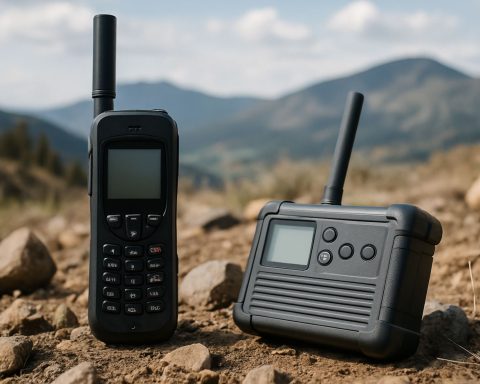- Top U.S. officials’ use of Signal for sensitive discussions raises national security concerns.
- Defense Secretary Pete Hegseth and Director of National Intelligence Tulsi Gabbard were involved in this security lapse.
- The inclusion of a journalist in confidential talks highlighted risks associated with the app’s accessibility.
- President Trump minimized the incident’s significance, though experts argue otherwise, prompting calls for investigation.
- The Senate Armed Services Committee and watchdogs advocate for legal and procedural scrutiny.
- The incident underscores risks tied to digital convenience and the necessity for secure communication protocols.
- Quantum computing advances hint at transformative potential, stressing the need for updated security measures.
- Companies should enhance policies to prevent unintentional data exposure due to personal device usage.
When the art of secrecy falters, it stirs not just intrigue but concern at the highest levels. The recent revelation that top U.S. officials discussed sensitive military operations on the encrypted messaging app Signal has cast a long shadow over national security protocols. Among those involved were notable figures like Defense Secretary Pete Hegseth and Director of National Intelligence Tulsi Gabbard. The mistake was glaring: inadvertently inviting a journalist into the fold of intensely confidential discussions magnified the blunder.
Although Signal touts its end-to-end encryption, its utilization here upended conventional practice. Sensitive information like war strategies should never grace the screens of unsecured devices. Traditionally, such discussions require face-to-face meetings or government-sanctioned secure lines. Signal’s vulnerability lies not in its encryption but in its accessibility—anyone can download it, as proven by the journalist’s accidental inclusion.
The administration’s response has been tepid. President Trump downplayed the severity, labeling the content non-classified, a view challenged by experts and political peers alike. The Senate Armed Services Committee now presses for an investigation, while watchdogs have turned to legal channels given the potential deletion of pertinent messages—a reminder of the digital footprint’s fragility.
This incident is a stark reminder that in today’s digital landscape, the allure of convenience can breed careless disregard for security. With 80% of employees utilizing personal devices for work-related tasks, the corporate realm isn’t immune to similar risks. Companies must heed this lesson, reinforcing policies that protect against unwitting exposure of proprietary data.
Beyond national security, technology’s march continues unabated. Quantum computing, with its promise of unprecedented computational power, moves from theory to potential reality. Industry leaders, including Liz Durst, emphasize its evolution, foreshadowing new strides as we approach an era where quantum error correction could redefine computing.
In essence, this blunder is more than a harbinger of political fallout; it underscores the persistent need for vigilance in our digital engagements. As we navigate an increasingly interconnected world, safeguarding our information—be it personal, corporate, or national—is an imperative that requires our steadfast attention.
Unveiling the Risk: Signal’s Role in National Security Breaches
Understanding the Implications of Signal in National Security
The recent slip involving top U.S. officials using Signal for sensitive discussions has raised numerous red flags concerning national security. Signal, an app renowned for its end-to-end encryption, found itself at the center of a controversy not due to flaws in its encryption but because of how it was used.
Key Facts:
1. Encryption Strength vs. Accessibility:
– Signal’s Encryption: Known for robust end-to-end encryption, Signal ensures that only the communicating users can read the messages. However, the application’s strength becomes a vulnerability when access controls are lax.
– Accessibility Issue: The risk arises from Signal’s easy accessibility. Anyone can download and use Signal, leading to potential inclusion of unintended participants, as happened with a journalist in this case.
2. Government Communication Protocols:
– Traditional secure communications for sensitive government discussions involve secure lines approved by government agencies or face-to-face meetings in controlled environments.
– The deviation from these protocols by using Signal was a glaring breach of established security practices.
3. Corporate Analogies:
– Similar risks exist in the corporate world where employees often use personal devices for work tasks. This incident serves as a warning that policies around data security must be reevaluated and enforced.
Delving into Quantum Computing
Beyond this debacle, technological advancements march forward with quantum computing emerging as a potential game-changer. Insights into quantum computing reveal its promise to revolutionize computational capabilities.
Insights & Predictions:
– Quantum Error Correction: As quantum computing advances, overcoming errors in quantum operations is crucial. Experts like Liz Durst predict that significant strides in quantum error correction will push the technology closer to practical applications.
– Industry Implications: The shift towards quantum computing presents industries with opportunities to harness unprecedented processing power but also necessitates new security protocols to handle quantum-level computations securely.
Pressing Questions Answered
1. Why is Signal’s Use Problematic in Government Affairs?
– Although encrypted, the unintended or unauthorized inclusion of individuals can occur if the application’s access is not rigorously controlled, risking exposure of sensitive information.
2. What Are the Repercussions for Government and Private Sectors?
– The incident highlights the need for stringent security measures across both sectors. Reinforcing communication protocols and ensuring secure environments for discussions are vital.
3. How Should Organizations Respond to This Risk?
– Implement Robust Security Policies: Ensuring all communication tools are sanctioned and secure.
– Training and Awareness: Educate employees on the importance of cybersecurity and the proper use of communication tools.
Actionable Recommendations
– Secure Communication Practices: Always use government-approved channels for sensitive communications.
– Regular Audits: Conduct regular audits of communication tools used within organizations to ensure compliance with security protocols.
– Education: Continually educate employees and officials on the importance of cybersecurity measures and the risks of using consumer apps for sensitive discussions.
For additional insights on cybersecurity, see CISA.
In conclusion, the challenge of balancing convenience with security is critical in today’s digital age. Organizations and government bodies must prioritize safeguarding digital interactions to protect sensitive information effectively.











